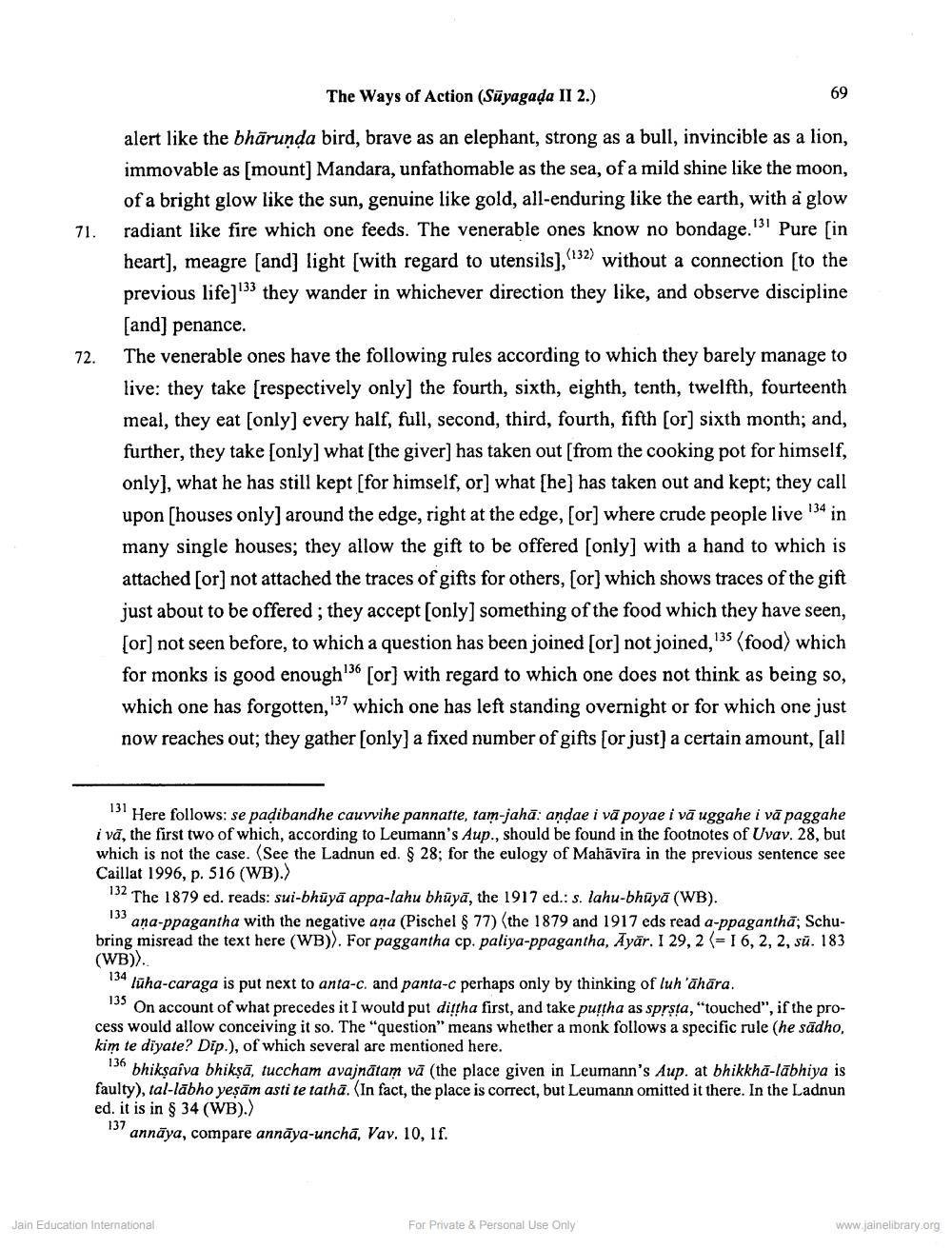________________
The Ways of Action (Süyagada II 2.)
69
71.
72.
alert like the bhārunda bird, brave as an elephant, strong as a bull, invincible as a lion, immovable as [mount] Mandara, unfathomable as the sea, of a mild shine like the moon, of a bright glow like the sun, genuine like gold, all-enduring like the earth, with a glow radiant like fire which one feeds. The venerable ones know no bondage."! Pure (in heart), meagre [and] light (with regard to utensils), (132) without a connection to the previous life] 133 they wander in whichever direction they like, and observe discipline [and] penance. The venerable ones have the following rules according to which they barely manage to live: they take (respectively only) the fourth, sixth, eighth, tenth, twelfth, fourteenth meal, they eat (only) every half, full, second, third, fourth, fifth (or) sixth month; and, further, they take [only] what (the giver) has taken out (from the cooking pot for himself, only], what he has still kept (for himself, or] what (he) has taken out and kept; they call upon [houses only] around the edge, right at the edge, [or] where crude people live 134 in many single houses; they allow the gift to be offered [only] with a hand to which is attached [or] not attached the traces of gifts for others, [or) which shows traces of the gift just about to be offered; they accept (only) something of the food which they have seen, [or] not seen before, to which a question has been joined [or] not joined, 135 (food) which for monks is good enough136 [or) with regard to which one does not think as being so, which one has forgotten,137 which one has left standing overnight or for which one just now reaches out; they gather [only] a fixed number of gifts for just a certain amount, [all
15 Here follows: se padibandhe cauvvihe pannatte, tam-jahā: andae i vā poyae i vā uggahe i vā paggahe i vã, the first two of which, according to Leumann's Aup., should be found in the footnotes of Uvav. 28, but which is not the case. (See the Ladnun ed. § 28; for the eulogy of Mahāvira in the previous sentence see Caillat 1996, p. 516 (WB). 152 The 1879 ed. reads: sui-bhūyā appa-lahu bhūyā, the 1917 ed.: s. lahu-bhūyā (WB).
159 ana-ppagantha with the negative ana (Pischel 877) (the 1879 and 1917 eds read a-ppaganthā; Schubring misread the text here (WB)). For paggantha cp. paliya-ppagantha, Ayār. I 29, 2 (= 1 6, 2, 2, sū. 183 (WB)). 134 lūha-caraga is put next to anta-c. and panta-c perhaps only by thinking of luh 'āhāra.
13 On account of what precedes it I would put dittha first, and take puttha as sprsta, "touched", if the process would allow conceiving it so. The "question" means whether a monk follows a specific rule (he sādho, kim te diyate? Dip.), of which several are mentioned here.
1 bhikṣaiva bhikṣā, tuccham avajnātam vā (the place given in Leumann's Aup. at bhikkhā-lābhiya is faulty), tal-lābho yeşām asti te tathā. In fact, the place is correct, but Leumann omitted it there. In the Ladnun ed. it is in § 34 (WB).) Wannāya, compare annāya-unchā, Vav. 10, 1f.
Jain Education International
For Private & Personal Use Only
www.jainelibrary.org




